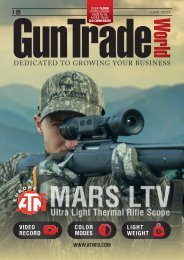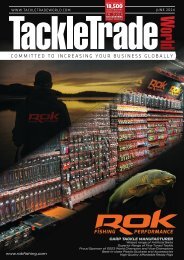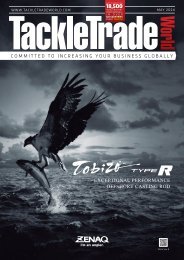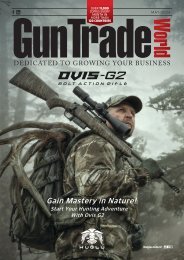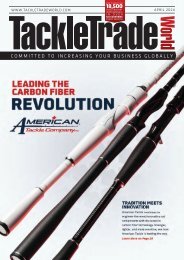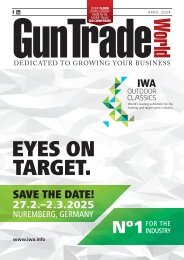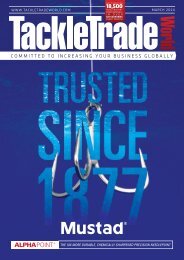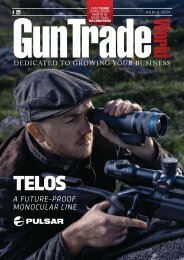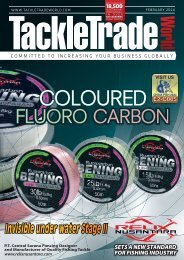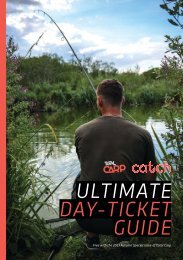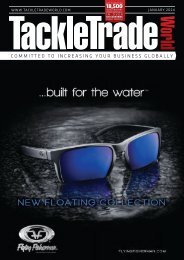Gun Trade World - January 2023
Create successful ePaper yourself
Turn your PDF publications into a flip-book with our unique Google optimized e-Paper software.
news<br />
BASC responds to lead ammo ban proposals<br />
A report circulated on 6 May this year by<br />
the Health and Safety Executive (HSE) –<br />
under UK REACH – proposed a complete<br />
ban on outdoor recreational uses of all forms<br />
of lead ammunition in England, Scotland<br />
and Wales, with limited derogations. The<br />
consultation on the proposals recently<br />
closed.<br />
BASC, The British Association for<br />
Shooting and Conservation, prepared<br />
a all-inclusive reaction, which we have<br />
summarised below:<br />
BASC’s response<br />
- Online submission to the UK REACH<br />
consultation<br />
- BASC review of the UK REACH Annex<br />
XV restriction dossier on lead ammunition,<br />
supported by:<br />
• BASC technical report: Accuracy and<br />
penetration testing of lead-free<br />
ammunition in .243 calibre<br />
• BASC technical report:<br />
Accuracy and penetration testing<br />
of lead-free ammunition in .22lr -<br />
rimfire calibre<br />
• BASC technical report: Accuracy<br />
and muzzle energy testing of leadfree<br />
airgun ammunition in .177<br />
and .22<br />
• BASC technical report: Weight<br />
retention of lead airgun pellets.<br />
Live quarry shooting<br />
There is clear evidence of risk of<br />
primary poisoning of birds from<br />
lead shot and of the human health<br />
risk from exposure to lead in game meat.<br />
Having assessed the evidence, BASC<br />
concluded that restrictions on the sale and<br />
use of both lead shot and expanding lead<br />
rifle ammunition for live quarry shooting<br />
would be effective at eliminating those<br />
proven risks.<br />
The transition periods for regulation of<br />
lead shot and expanding rifle ammunition<br />
must be agreed in close consultation with<br />
the shooting sector and take account of<br />
technical and global supply chain issues.<br />
To support BASC’s position, it has<br />
submitted a series of technical reports.<br />
These demonstrate the need for raising<br />
the threshold of ‘small calibres’ within the<br />
UK REACH dossier to include any calibre<br />
below 6.5mm. This would provide a longer<br />
transition period for calibres such as .243.<br />
For rimfire ammunition, BASC is asking<br />
that restrictions are not implemented<br />
until suitable lead-free alternatives can be<br />
guaranteed at scale.<br />
ASC maintains its view that airgun<br />
ammunition should not be restricted as<br />
the risk to human health can be managed<br />
through existing sector guidance on game<br />
meat handling. BASC has also prepared a<br />
technical report demonstrating the inherent<br />
unsuitability of existing lead-free airgun<br />
ammunition for live quarry shooting.<br />
BASC remains committed to the<br />
voluntary transition away from lead shot<br />
and single use plastics for shotguns used<br />
in live quarry shooting. As such, it believes<br />
that further regulation is not required in this<br />
area.<br />
Clay pigeon and target shooting<br />
BASC says that the evidence presented by<br />
the HSE on secondary exposure to birds,<br />
plus lead exposure pathways to livestock and<br />
other animals, soil, soil organisms, plants,<br />
and surface waters, is not conclusive.<br />
The association believes that the HSE has<br />
failed to address uncertainty in the evidence<br />
as is required by regulatory guidance. As a<br />
result, restrictions based on these risks are<br />
unnecessary and disproportionate.<br />
BASC deems that lead shot could<br />
continue to be used for clay pigeon /<br />
target shooting at venues where risks of<br />
primary exposure to birds is managed. It<br />
also advocates that lead rifle ammunition<br />
(non-expanding) can continue to be used<br />
on ranges. BASC believes that current legal<br />
and regulatory frameworks are effective and<br />
further regulation risks the unnecessary<br />
‘gold plating’ of environmental directives.<br />
BASCs requests<br />
BASC is also making the following requests<br />
of the HSE:<br />
1. Re-assess the use and risk of lead<br />
ammunition in the UK context.<br />
2. Uphold the transparency requirements<br />
of the European Chemicals Agency<br />
(ECHA) for Annex XV restriction dossier<br />
preparation.<br />
3. Reassess their estimate of lead shotgun<br />
ammunition use.<br />
4. Reassess their estimate of rifle<br />
ammunition use.<br />
5. Review their assessment of environmental<br />
and human health impacts and benefits of<br />
restrictions.<br />
6. Ensure accurate costs are applied during<br />
the forthcoming socio-economic impact<br />
assessment.<br />
7. Thoroughly explore the uncertainty in the<br />
evidence in relation to secondary poisoning<br />
of birds from lead ammunition.<br />
8. Thoroughly explore the uncertainty in the<br />
evidence in relation to impacts on ‘other’<br />
animals from lead ammunition.<br />
9. Thoroughly explore the uncertainty in<br />
the evidence in relation to impacts on soil,<br />
soil organisms and vegetation from lead<br />
ammunition.<br />
10. Exclude surface and ground waters from<br />
its proposals.<br />
11. Move the boundary for defining ‘large<br />
calibre’ centrefire ammunition to<br />
≥6.5mm.<br />
12. Ensure that any restriction<br />
and transition period for rimfire<br />
ammunition is reviewed before<br />
implementation.<br />
13. Drop proposals for restricting<br />
the use of lead airgun ammunition.<br />
14. Consider providing extended<br />
transition periods for small gauge<br />
shotgun calibres of 28 bore and<br />
smaller.<br />
15. Revise restriction proposals,<br />
ensuring that they are<br />
proportionate to the evidenced<br />
risk, make best use of existing legal<br />
and regulatory frameworks and<br />
avoid ‘gold plating’ existing environmental<br />
directives.<br />
16. Implement a buy-back scheme to: a.<br />
Fairly compensate material loss resulting<br />
from restrictions; b. Incentivise the<br />
transition to lead free alternatives; c. Ensure<br />
that the restrictions do not create a ‘false’ or<br />
‘early’ cliff- edge for sales of lead products<br />
that undermines manufacturers’ ability to<br />
invest in development and production of<br />
lead-free alternatives.<br />
Next steps<br />
The HSE and Environment Agency (EA)<br />
will review the consultation responses<br />
prior to preparing a final restriction report.<br />
This report, expected to be published<br />
in early summer <strong>2023</strong>, will be a set of<br />
recommendations to Defra. This will provide<br />
the basis for legislation.<br />
It is likely that a 60-day consultation<br />
will launch in February <strong>2023</strong> as part of the<br />
HSE’s Socio-Economic Impact Assessment<br />
of proposals.<br />
www.basc.org.uk<br />
10 www.guntradeworld.com






